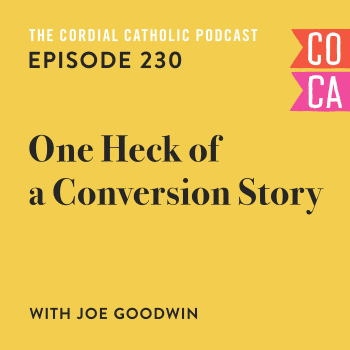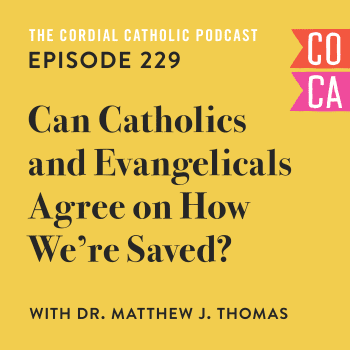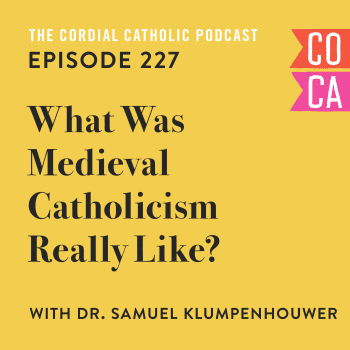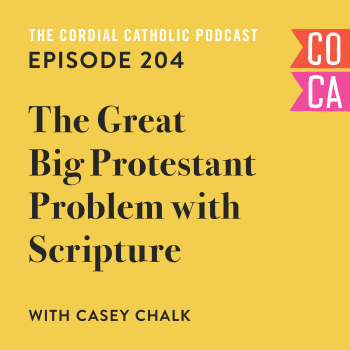
This article is part of the Tough Questions series. A series highlighting some of the difficult questions I was asking during my conversion from a non-denominational Christian to full communion with the Catholic Church. For more about my own conversion story, read What I Wish I Knew About Catholics (And Why I’m Becoming One).
As a non-denominational Christian, I had a passing knowledge that Catholic Bibles were bigger. I knew that they contained more books and we referred to these books as the “apocrypha” but I didn’t really understand what they were all about. It seemed to me that Catholics had “added on” to the Bible—the Holy Word of God—in the same way that Mormons did with their extra-biblical narratives or in the way the Jehovah’s Witnesses tampered with translation to make their theologies fit.
Clearly, I had no clue.
When I dug into the history of Christianity and, in particular, Martin Luther and the Protestant Reformation, I came face to face with some pretty tough questions about how I’d understood the Bible up to then.
In particular, I was forced to confront the question of how I knew I could trust the Bible I held in my hands; the Bible which was the be-all-and-end-all of my understanding of God and Jesus Christ His Son.
How could I trust that the Bible I had was the “right” Bible? That it contained everything God wanted me to know.
Something About the Septuagint…
In my reading and research about the Reformation I came across something known as the Septuagint. The Septuagint was a Greek translation of the Old Testament read by Jewish believers. It was a particular collection of writings which included what I understood to be the “apocryphal” books. At this time, in the middle ages, several different versions of the Hebrew Old Testament canon actually existed and which canon was widely read depended on region and religious sect. In other words, in different parts of Europe and the Middle East, different Hebrew Bibles were used.
At the time of the Protestant Reformation, as Luther and the reformers sought to print and distribute copies of the Bible they faced the challenge of knowing which Old Testament canon to translate and print. Diarmaid Macculloch, a Reformation scholar, writes that the Jewish believers that crossed Luther’s path preferred the Masoretic canon over the Septuagint. The Masoretic text did not include the “apocryphal” books but because the Masoretic text was what the Jews that Luther knew were using, he held it to be a more authentic choice.
So, despite a long tradition of Christians affirming these 7 books in the Bible, Luther’s widely read and distributed version had seven fewer books in its Old Testament than previous, popular translations.
What Luther Didn’t Know…
Martin Luther’s successful and popular Bible did a great deal to empower Christians to know and read the Word of God. Although history shows that his efforts are probably overstated—the Catholic Church had actually been translating and distributing the Bible as well—the massive popularity of the Bible in the common language created seismic shifts in the Christian Church.
But Luther’s translation was tricky and decision to promote a “smaller” Bible suffers four devastating blows in the light of history.
1. Other Jews used the Septuagint
Luther chose not to include seven books of the Old Testament because, scholars say, the Jewish believers he knew didn’t have them in their canon. But what Luther didn’t know was that Jewish believers elsewhere in Europe and the Middle East did. Luther was a product of his time, after all, and the medieval world could be a small place. In other parts of the world, outside of Luther’s limited purview, the Septuagint was widely in use. Those seven books of the Bible were the inspired Word of God for Jewish believers.
2. The Church Fathers used the Septuagint
Likewise, the Early Church Fathers, those Christians that followed the apostles appointed by Christ referenced, referred to, and even quoted from the Septuagint version of the Old Testament. At the time, in medieval Europe, Luther wouldn’t have had the same access to these ancient Christian writing that we do today but these Christians, very close to the original source of Christ Himself, believed in an Old Testament canon that included the seven books which Luther removed.
3. The Apostles Used the Septuagint
But the Early Church Fathers were only playing follow the leader, of course, because a critical study of the letters of the Apostle Paul demonstrate clearly that he too was using the Septuagint translation when quoting the Old Testament. As with the Christians that came immediately after him, Paul’s version of the Old Testament was the Septuagint.
In a famous piece of Scripture Paul even writes to Timothy, his disciple, that “all Scripture is God-breathed and is useful for teaching, rebuking, correcting and training in righteousness, 17 so that the servant of God may be thoroughly equipped for every good work” (2 Tim 3:16-17). What Scripture is Paul referring to? Remember, the New Testament didn’t yet exist. Paul was referring to a Scriptural canon that included the seven “apocryphal” books.
4. Jesus Used the Septuagint
Finally, it should be obvious that if the Early Church used it and if the Apostles used it then they must’ve got the idea from somewhere, right? Certainly, because Jesus Himself used the Septuagint as well.
Incredibly, critical biblical research demonstrates without a doubt that the version of the Old Testament which Jesus regularly quotes is, in fact, the Septuagint. God Himself, indeed, quotes a version of the Hebrew Bible which includes the seven “apocryphal” books.
I don’t think we can get any closer to the source than this.
So Why Does it Even Matter?
As I was exploring my faith and digging, especially, into the history of the Bible I was shocked to discover the roots of the Catholic vs. Protestant Bible debate. I was dismayed to learn that scholars pin the removal of the seven “apocryphal” books from Luther’s translation on the fact that Luther didn’t think Jewish believers actually revered them. Because the Jews in Luther’s part of the world didn’t read them, even those elsewhere they were widely read.
I was surprised that this was all it took to create two different, disparate, versions of the Bible.
And I faced the tough question of figuring out how I was supposed to trust that the Bible I held in my hands was the complete thing. That it was all God wanted me to have to equip me to live out my faith.
Because if Luther can remove seven books—books which were clearly important to other Jews, the Early Church, the Apostles, and Jesus Himself—how do I know that what I have in my hands is right and complete?
Because, ultimately, the Bible did not come handed down from God with a divine table of contents. The decision of one figure of the Reformation, evidently, can alter it rather distinctly so that we end up, 500 years later, with two critically different versions of what Protestants and Catholics both view as the complete and unalterable Word of God.
So, it matters.
And on my journey out of non-denominational Christianity and into the Catholic Church I realized that, on the Bible, I would have to put more faith in the version which was, for 1,500 years, in wide distribution. A version that was quoted by the Early Church, by the Apostles, and used by Christ Himself, than in a version which had been edited much later. On the Bible, then, I had become Catholic. The rest of it would follow.












